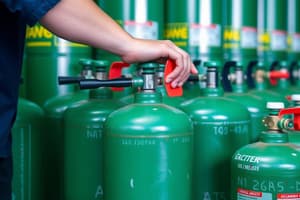Podcast
Questions and Answers
What is the recommended storage condition for cylinders to prevent accidents and ensure a safe working environment?
What is the recommended storage condition for cylinders to prevent accidents and ensure a safe working environment?
- Stack cylinders to save space
- Store cylinders on their sides to maximize space
- Store cylinders upright with the valve facing upward (correct)
- Place heavy objects on top of cylinders for stability
Why should heavy objects not be placed on top of cylinders?
Why should heavy objects not be placed on top of cylinders?
- To prevent toppling over of the cylinders (correct)
- To avoid damaging the heavy objects
- To utilize space more efficiently
- To make it easier to stack more cylinders
Why is it important to avoid stacking cylinders?
Why is it important to avoid stacking cylinders?
- To ensure proper ventilation around the cylinders
- To save space in the storage area
- To prevent potential reactions with other stored materials
- To prevent damage to the cylinders (correct)
What type of connections should be used to prevent accidental ignition of acetylene?
What type of connections should be used to prevent accidental ignition of acetylene?
Why should oxygen and acetylene cylinders not be stored near other gases or chemicals?
Why should oxygen and acetylene cylinders not be stored near other gases or chemicals?
How can you effectively store oxygen and acetylene cylinders to ensure safety in a well-ventilated area?
How can you effectively store oxygen and acetylene cylinders to ensure safety in a well-ventilated area?
Why is it important to store oxygen and acetylene cylinders in a well-ventilated area?
Why is it important to store oxygen and acetylene cylinders in a well-ventilated area?
What should be avoided in the storage area to prevent accidents involving oxygen and acetylene cylinders?
What should be avoided in the storage area to prevent accidents involving oxygen and acetylene cylinders?
Why is it recommended to store oxygen and acetylene cylinders separately?
Why is it recommended to store oxygen and acetylene cylinders separately?
What is the purpose of labeling cylinders with their contents and expiration dates?
What is the purpose of labeling cylinders with their contents and expiration dates?
Why should storage cabinets be made of fire-resistant materials?
Why should storage cabinets be made of fire-resistant materials?
What should workers do if they find leaks or cylinder damage during inspections?
What should workers do if they find leaks or cylinder damage during inspections?
Study Notes
Storage of Oxygen and Acetylene Cylinders
Storing oxygen and acetylene cylinders safely is crucial to prevent accidents and ensure a secure working environment. These gases, when combined, can lead to violent explosions due to their exothermic reaction. To minimize risks, it's essential to understand the proper storage methods and guidelines.
Storage Location
Oxygen and acetylene cylinders must be stored in a well-ventilated area, such as a fire-resistant, specially designed ventilated storage cabinet or room. This provides adequate airflow and keeps the area free from ignition sources, such as flames, electrical appliances, and high temperatures.
Separation
Oxygen and acetylene cylinders should be stored separately to prevent direct contact and prevent the possibility of ignition. Storage cabinets should be equipped with dividers to maintain an appropriate distance between cylinders.
Labeling
Cylinders should be clearly labeled with their contents and expiration dates. This allows for proper identification and helps workers avoid mixing the gases.
Inspection
Conduct periodic inspections of storage areas. Check for leaks, cylinder damage, and worn-out safety devices. Always replace or repair defective components immediately.
Safety Measures
- Ensure that storage cabinets are made of fire-resistant materials.
- Install safety devices, such as pressure-relief valves and safety relief devices, to prevent excessive pressure build-up and help control the release of gas in case of leaks or overpressure.
- Make sure cabinets are equipped with non-sparking hardware.
- Properly secure cylinders to prevent toppling over.
- Keep floors free of debris, oil, and other potential ignition sources.
Storage Conditions
- Store cylinders upright, with the valve facing upward and away from any potential source of ignition.
- Avoid stacking cylinders or placing heavy objects on top of them, as this can cause damage.
- Do not expose cylinders to direct sunlight or extreme temperatures.
Compatibility
Oxygen and acetylene cylinders should not be stored near other gases, chemicals, or materials that could potentially react violently with them. Spark-proof connections should be used to prevent accidental ignition of acetylene from static electricity or other ignition sources.
By following these guidelines, you can effectively store oxygen and acetylene cylinders safely in a well-ventilated area. This helps prevent accidents and ensures a safe working environment. Remember to always consult local regulations and guidelines for specific storage requirements in your area.
Studying That Suits You
Use AI to generate personalized quizzes and flashcards to suit your learning preferences.
Description
Learn about the proper methods for safely storing oxygen and acetylene cylinders to prevent accidents and ensure a secure working environment. This includes information on storage location, separation, labeling, inspection, safety measures, storage conditions, and compatibility.




